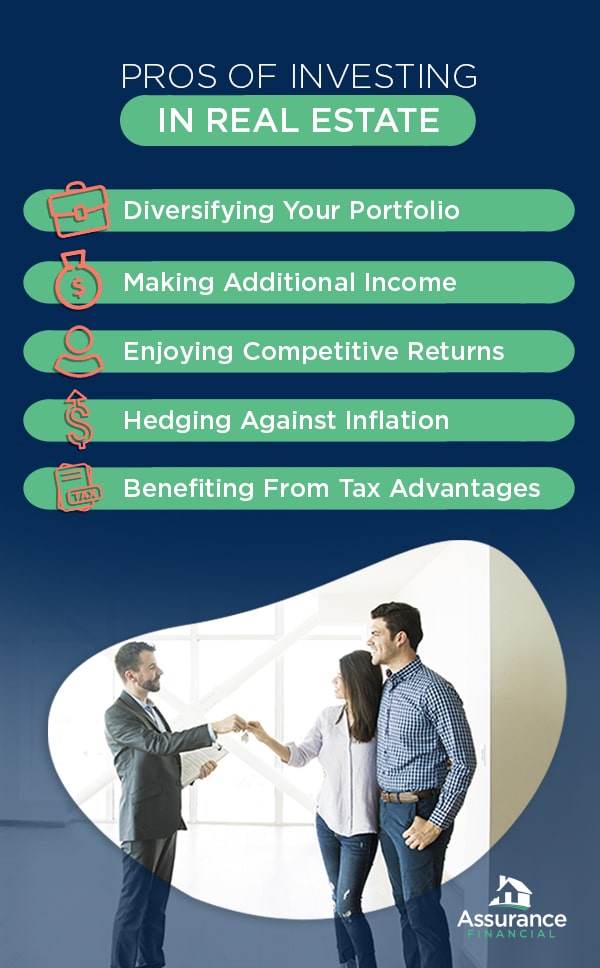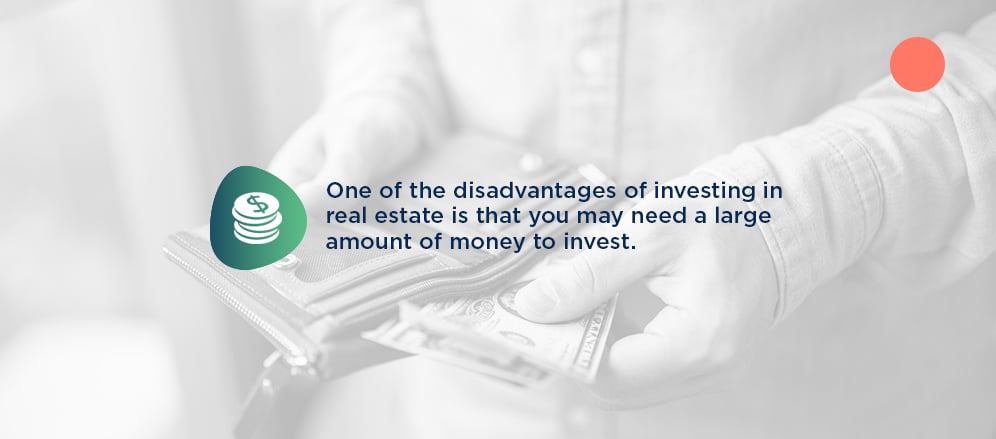Many people are turning to real estate investments these days. But how do you know if this is the right investment strategy for you? Is property a good investment now?
Real estate can be a good investment for anyone looking to diversify their portfolio and gain additional income. Though investing in real estate may not be the right option for everyone, many investors can get the most out of investing in real estate by following some simple tips. We have compiled this guide to show you why real estate is a good investment for some.

What Is Real Estate Investing?
There are actually quite a few ways to invest in real estate. While most people tend to assume real estate investing refers to buying rental properties to gain cash flow and appreciation over the long term, there are other ways to make money in real estate investment besides becoming a landlord.
The following are a few other methods of real estate investing:
- Flipping houses
- Wholesaling properties
- Buying and holding rental properties
- Becoming a limited partner in syndications
- Investing in a real estate investment trust (REIT)
The real estate investment strategy you choose will depend on how passive you want investing to be. Investing can be as simple as moving money into a REIT with a click of a button or as involved as flipping houses — which is more like starting your own business than investing in the stock market.
Because real estate investment can take several different forms, investing in real estate can be accessible to many investors regardless of their preferred investment strategy. Whether you want a passive or active investment, real estate investing can be the right choice for you.
Is Real Estate Investment Right for You?
You’ll need to consider your situation to determine if investing in property a good idea for you. Real estate can generate regular passive income for you and can be a long-term investment that increases in value over time. Many investors use real estate investment to begin building their wealth.
However, depending on what strategy you choose, real estate investment can require a significant amount of money and ongoing maintenance. Buying an apartment complex, house or piece of land can be quite expensive. If you purchase a property, you will also need to have enough income or savings to protect you financially from income gaps if you go a few months between tenants.
The Process of Real Estate Investment
Consider the following information you need to know about real estate investment to determine if this investment strategy is right for you:
1. Determine Your Funding Method
Financial experts tend to warn against investors borrowing money to buy investments. You may want to consider whether you can pay with cash before you buy a piece of real estate for investment purposes. If you cannot afford to buy the home with cash, you should at least be able to afford your mortgage payments for the home without rental income.
When you invest in rental properties, there is a chance you may experience high turnover with renters. In fact, you may experience a period of time in which you have no renters for the property. If you cannot afford to pay the monthly mortgage without the rental income, this may become more of a financial burden than an investment. If you cannot pay your mortgage payment, this could damage your credit and cost you more money in the long term.
2. Start Small
Many investors begin investing in real estate by starting small. You may want to start by buying a home with a basement apartment or purchasing a duplex, which can allow you to live in one unit and rent out the other to a tenant. If you are comfortable living in the same building as a tenant, this can be a good way to dip your toe into real estate investment while also mitigating your risk.
When you create your budget, ensure you can live comfortably while paying the entire mortgage without the need for rent payments. If you grow more comfortable with investing in real estate and managing a property, you may want to purchase a larger property that can increase your income potential.
Owning several properties makes it easier to buy and manage more properties, which means you will earn an even greater return on your real estate investments.
3. Research the Property
Doing your research is an important part of the home or land buying process. For example, if you have decided to purchase land to sell at a future date, you may want to research the deed for the land thoroughly. Are there new roads planned near the land you are purchasing? How might this affect the value of the property?
You may also want to determine whether there is a lien on this property. Consider the comparables in the area, particularly if there are any factors that may affect the value of the property. After you complete your research, you can more easily determine whether purchasing this property is the right investment for you.
4. Plan Your Expenses for the Property
Before you purchase a property for real estate investment, you may want to consider the additional costs of owning a property, such as repairs, utilities, taxes, homeowners’ insurance and upkeep.
You may also want to consider going through a rental company that can handle the ongoing maintenance of your property, such as rent collection and repairs. While working with a rental company will cost you money, it can also make owning and managing a rental property easier. If you do not have time to manage the property but you want to use this investment strategy, using an agency may be a good option for you.
When pricing your rental property, consider these fees and additional expenses. You may want to include these expenses in the price of the property to ensure you are fully covered. You may also want to save the surplus income from your first few months of rental property ownership to cover the costs of property repairs.
While every investment comes with some level of risk, you can help minimize your risk by doing your research and planning for the entire cost of a property ahead of time.
Where Should I Invest in Real Estate?
Figuring out where to invest in real estate can be tricky for first-time investors. Here is a list of some common places to invest in real estate:
1. Rental Properties
One way you may choose to invest in real estate is by investing in rental properties in your area or in another part of the country that has a booming real estate market. You may be able to find a property that will have combined expenses that are lower than what you can charge a tenant in rent. If you would rather not manage the property personally, you can hire a property manager to handle the ongoing maintenance for you.
2. Flipping Houses
Another way you may want to invest in real estate is by flipping houses. To flip a house, you first invest in a low-priced property in need of renovations. You can renovate the home as inexpensively as possible and resell the property for a profit. This can be one of the riskiest real estate investment strategies, but the return on investment can also be sizable and it comes as soon as you sell the home.
3. Online Investing Platforms
A more passive way of investing in real estate is by using an online platform. These investing platforms for real estate allow investors and borrowers to connect. Investors can help finance projects for developers through equity or debt. In exchange for paying a fee to use the platform and for taking on a large risk, an investor may receive a quarterly or monthly distribution.
4. Real Estate Investment Trusts
Another area in which you can invest in real estate is in REITs. If you want to invest in real estate but you do not want to deal with physical properties, you may want to consider purchasing REITs. These often pay high dividends, which is why they are a common retirement investment. If you do not want or need regular income, you can reinvest your dividends automatically to grow your investment further.
Pros of Investing in Real Estate
There are several advantages that make real estate a good investment for some individuals — including generating passive income, building wealth, offering tax advantages and building equity. While riskier than other investments, investing in real estate can offer greater returns than investing exclusively in the stock market. The following are the pros of investing in real estate:
1. Diversifying Your Portfolio
Many financial experts encourage portfolio diversification so clients can better manage their risk. If your financial advisor does not encourage real estate investment as part of your investment portfolio, this may simply be because they may not be able to make a commission if you buy and sell a property.
Investing in real estate can be one of the most beneficial ways to diversify your portfolio. You can enjoy greater security with tangible assets as opposed to the more volatile nature of stocks, mutual funds and bonds. Diversifying your portfolio is key to ensuring your financial security. By investing in real estate, you can receive a higher return and lower the volatility of your financial portfolio.
2. Making Additional Income
Another advantage of investing in real estate is that you can make additional income. Whether you enjoy passive income from a hands-off investment or you choose to purchase and manage a property yourself, investing in real estate can offer an additional, stable income that is protected from the volatility of the stock market.
If you want to increase your monthly and annual income, real estate investment can be a great option. Investments that supplement income tend to be less volatile than other investments and can make the difference between struggling during your golden years or securing dependable retirement savings.
3. Enjoying Competitive Returns
Real estate investment can potentially offer more competitive returns than stocks and bonds. You enjoy the returns every year from the passive income generated by the rental property, and you can also reinvest that income by purchasing additional properties or putting this money toward your retirement savings. You may also enjoy an annual appreciation of the property’s value.
4. Hedging Against Inflation
Another advantage of real estate investment is that you are protected from the long-term effect of inflation. Inflation refers to the economic reality of prices increasing over time because the value of money decreases.
Inflation can vary annually and negate the actual returns you get from other investments. However, real estate can be a hedge against inflation, as a property is a tangible asset and real estate keeps pace with inflation. Real estate is inherently limited in supply, which gives properties an intrinsic value and allows values to rise over time along with inflation.
If you have a fixed-rate mortgage on the property, the cost of owning the property will not increase, even as the price of rent increases. Inflation will increase the cost of living, which means your cash flow will increase while your cost of ownership does not. Inflation also increases the value of your property, so it will be worth more when you are ready to sell in the future.
5. Benefiting From Tax Advantages
When you invest in real estate, you may also be able to benefit from a range of tax advantages. When you invest in real estate using money that is in your 401(k) or an IRA, you may be able to buy an investment property or purchase shares of a real estate fund. When you do this, you may be able to collect ongoing income that is tax-deferred until your retirement. On the other hand, you can choose to pay the tax now, as you may be able to enjoy a lower tax rate than you will at retirement.
Even if you choose to purchase and manage a property yourself, you can also benefit from several tax deductions — like deducting maintenance and operating expenses, depreciation or paying long-term or short-term capital gains when you sell the property. You also will not have to pay self-employment tax on the cash flow from your rental properties.
Is investing in real estate worth it? For you, the advantages of real estate investment may make this a worthwhile investment strategy to add to your financial portfolio.
Cons of Investing in Real Estate
While investing in real estate can offer many advantages to investors, there are disadvantages to any investment. These could include the requirement of money and time and the risks that come with investing in real estate. The following are the cons of investing in real estate:
1. Real Estate Investing May Require Money Upfront
One of the disadvantages of investing in real estate is that you may need a large amount of money to invest. As the saying goes, you need money to make money, particularly if you are planning to purchase a rental property.
To buy a property, you may need a down payment and the money to cover closing costs and repairs. When you purchase the property, you will also need to cover ongoing expenses, such as mortgage payments, insurance, property taxes and maintenance. The cost of investing in real estate can be significant, so you may need to save a substantial amount before you are able to invest.
2. Real Estate Investing May Require a Lot of Time
Another disadvantage of investing in real estate is that you may need to invest a lot of your time. Along with managing the property, you may also need to spend your time learning how to invest in real estate and how to manage a property. There is a learning curve to investing in real estate, and you could lose money if you go in blindly. If you choose to manage your rental property actively rather than hire a property manager, this can also consume a lot of your time.
To save yourself time, you may want to hire a service that can manage your rental property for you. This can give you many of the benefits of owning a rental property without requiring a large investment of your time.
3. Real Estate Investing Tax Benefits May Not Apply to You
Unfortunately, tax benefits do not apply to every property owner. At certain levels of income, you may not qualify for certain tax advantages. Before you assume that you qualify for a tax break, you may want to speak with a tax professional who has experience in real estate and can provide you with advice that is specific to your financial situation.
4. Real Estate Investing Comes With Certain Risks
You may want to be aware of the risks that come with real estate investing so you can understand and mitigate them as much as possible. The following are some of the risks of real estate investment:
- Taking on too much debt
- Buying property at the wrong time
- Purchasing the wrong property
- Dealing with a bad tenant
- More liability for accidents that occur on your rental property
One of the biggest risks that investing in property can pose to investors is acquiring too much debt. You may want to ensure that you can make your monthly payments on time even when you are dealing with tenant problems, unexpected repairs, property vacancies, market dips and maintenance costs.
Though real estate investment can come with some disadvantages, the benefits often outweigh the risks for investors. If you are extremely risk-averse, investing in real estate may not be the right investment choice for you. If you are comfortable with taking on some risk in your investment strategy, real estate can be an excellent investment option for you.
Contact Assurance Financial to Start Investing
Assurance Financial was established in 2001 to service the loan industry. Our full-service, in-house team supports our branches and gives our loan officers the flexibility they need to serve their customers and territories. We service your loan from beginning to end to save you time. As The People People, we’ll provide you with the care you need every step of the way. At Assurance Financial, we can help you choose the right mortgage for your real estate investment.
Ready to start investing? Get in touch with Assurance Financial or apply for a loan with or virtual assistant Abby today.
Sources









